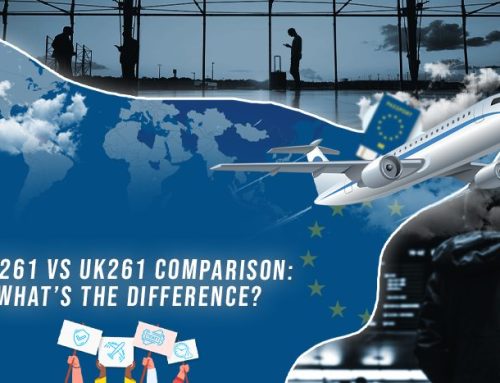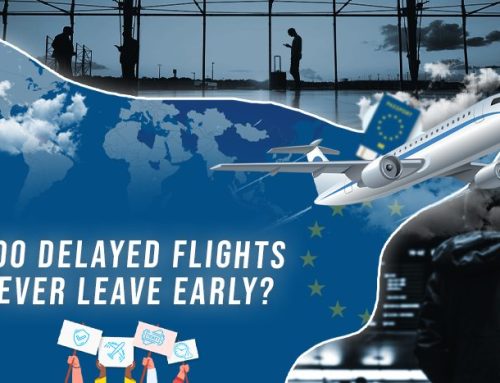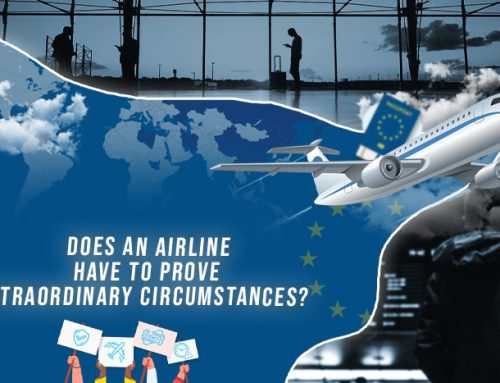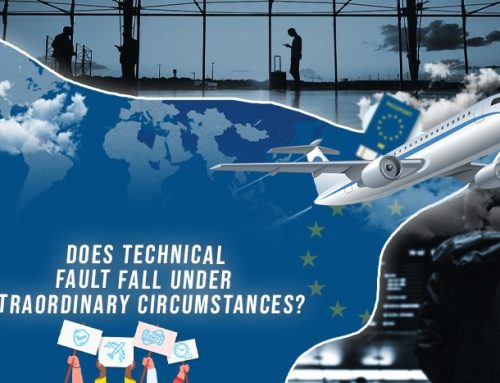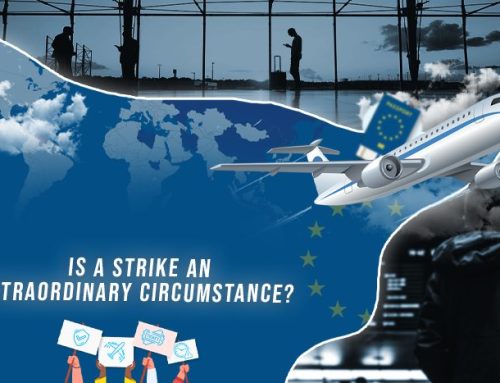“Your flight has been delayed.”
Imagine this pops up in your messages when you have done all your packing and are ready to go to the airport to fly off to the holiday trip you’ve been waiting on for months.
While air traveling is the most efficient and comfortable mode of travel, it has its flaws, e.g. delayed flights. Passengers are forced to wait around for hours and hours with no idea of what’s going on.
Flight delays are becoming more and more common and causing a lot of trouble, but even seasoned travelers know that delays can happen frequently in air travel. As more and more people book flights, airport capacity struggles to keep up with this untended growth. As a result, flight delays and cancellations continue to swell. Of course, there are many reasons why flights are commonly delayed, so in this article, we will look at why flights get delayed, what you can do about it, and how you can get compensated when they experience delayed flights.
Key Takeaways
- Flight delays are a common issue in air travel and can be caused by a variety of factors such as air traffic control delays, bad weather conditions, technical issues, and waiting for connecting passengers.
- Passengers should remain informed about flight delays as soon as possible to avoid any inconvenience and subscribe to airlines’ free text alerts. Additionally, passengers may be eligible for compensation if their flight is delayed for 3 or more hours under EU regulation No. 261/2004.
- Airports should manage increased traffic by increasing their runway capacities and keeping up with the latest technology to avoid congestion and flight delays.
- Technical issues like engine problems, electrical problems, hydraulic problems, leakages, and brake issues can cause sudden flight delays, which can be repaired and fixed but can take some time.
- Bird strikes are an increasing problem that causes flight delays, but some aviation companies are using trained falcons to scare birds away and combat this issue.
Air Traffic Control (ATC) Delay
You’ve probably seen those large towers at the airports. These towers are for Air Traffic Control (ATC) and are the most common cause of flight delays.
What is an ATC Tower?
ATC towers are secondary radars that observe and control air traffic from airports and give clearance to aircraft to take off or depart from the airport.
Reasons for ATC Delays
Various reasons can cause ATC delays, including:
- Weather conditions like snow and storm
- Maintenance
- Crew problems
- Runway shortage
- Loading of baggage
- Bad Weather Condition
When it comes to bad weather, the first thing that comes to mind is a flight delay. Most airlines will not let you board if they are experiencing bad weather conditions. It is another common cause of flight delays.
Flying during bad weather conditions such as snowstorms, thunderstorms, heavy rain, strong wind, low visibility due to fog, and hurricanes are extremely dangerous. So, to avoid any hazards and dangers to passengers, airlines delay flights.
Since lousy weather is naturally occurring, airlines are not responsible for any compensation.
Birds Striking
The number of bird strikes has been steadily increasing over the years, causing more and more flight delays. If tangled up in the engine, a flying bird can cause severe damage to the aircraft engine and put the flight crew and many passengers at risk.
Some aviation companies have started using trained falcons in airports to scare birds away to combat this issue.
Congestion In Air Traffic
Congestion in Air Traffic is a big reason for flight delays and affects both airlines and passengers. Air congestion is caused when too many flights are allowed to use the airport over time resulting in overcrowding.
Airports should reduce air congestion and manage the increased traffic by increasing their runway capacities and keeping up with the latest technology to avoid delays.
Technical Issues
Sometimes aircrafts face sudden technical issues and need maintenance or repairs before the takeoff. All this repairing and fixing takes time which causes flights to be delayed.
Common Technical Problems
- Engine Problems
- Electrical Problems
- Hydraulic Problems
- Leakages
- Issue In Opening and Closing of Landing Gear
- Brakes
Common Technical Problems (Caused by External Factors)
- Bird strike
- Lightning strike
Waiting For Connecting Passengers
Sometimes a flight delay is as simple as waiting for connecting passengers to arrive. Luckily, these flight delays don’t last long and tend to be rather insignificant. Connecting passenger delays typically occur at peak times and when airport congestion is an issue. Know that if you are flying to or from Europe or on a European airline and your flights is delayed 3 or more hours, you may be entitled to compensation.
Security Concerns
There is always more happening at an airport than what meets the eye. Behind the scenes, crews and personnel are always working to make sure flights and airports are as safe as possible. Unfortunately, this vigilance can lead to some rather hefty delays. It isn’t uncommon for a plane to become delayed if security personnel find that something may be awry with a passenger or even a piece of luggage loaded onto the plane. If this happens, they will demand that the flight and luggage be unloaded, resulting in delays. In this situation, you are not eligible for compensation.
What to Do When Your Flight Gets Delayed?
It’s best to remain to be notified about the delays as soon as possible to avoid any inconvenience. Since most flight delays are notified at the last minute, it’s best to subscribe to airlines’ free text alerts so that you’re notified as soon as such a thing happens and you can make necessary arrangements.
Sometimes, a connecting flight gets delayed and you’re stuck at the airport till the next morning. In such cases, the airlines might offer free accommodation or they might not (since they’re not required by the law to do so.) However, it’s best to ask if you can get free accommodation.
Do You Get Compensation If Your Flight Is Delayed?
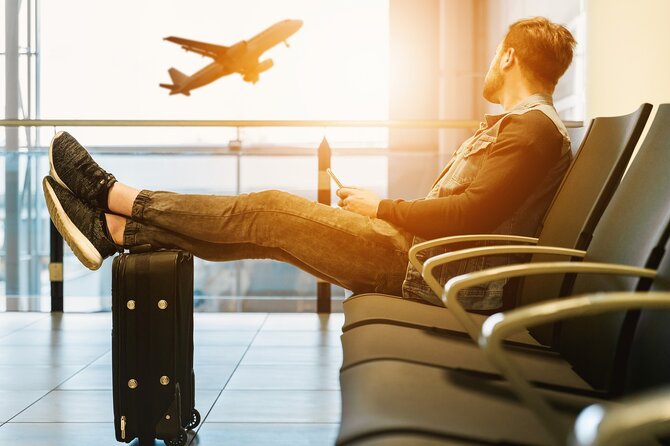
As per the EU regulation No. 261/2004, if your flight arrived at the destination 3 or more than 3 hours later than the specified time, you are eligible for compensation. However, the amount of the compensation does not depend upon the amount you initially paid for the ticket. Your flight delay compensation depends upon the distance of the flight.
So, for shorter flights (up to 932 miles) you’ll receive a £230 compensation, for medium (up to 2175 miles) and long distance (2175 miles or more) flights, you’ll receive £360 and £540 in compensation, respectively.
Conclusion
No one likes to sit around for hours on end, waiting for their flight to take off. However, flight delays happen, which can be anything from bad weather to mechanical or technical issues or even a bird strike.
These issues can cause passengers a lot of trouble and even more if the flight is delayed for an extended period.
You should check your airline’s website before leaving your house for the airport to avoid a long delay.
However, if you’ve recently faced a flight delay and are confused whether you qualify for flight delay compensation you can visit this page to find out companies that can assist you.
Frequently Asked Questions
-
What are some common reasons for flight delays?
Some common reasons for flight delays include bad weather, air traffic congestion, mechanical problems, crew availability issues, and security-related incidents.
-
What can I do if my flight is delayed?
If your flight is delayed, you can stay updated on the status of your flight through airline apps or websites, seek assistance from airline staff, and potentially be eligible for compensation if the delay is significant.
-
How long can a flight be delayed before it is cancelled?
There is no set amount of time that a flight can be delayed before it is cancelled. However, airlines are required to compensate passengers for significant delays and cancellations under certain circumstances.
-
Can I get a refund if my flight is delayed?
It depends on the airline’s policies and the circumstances surrounding the delay. Some airlines offer refunds or vouchers for future flights in the case of significant delays, while others do not.
-
How can I prevent my flight from being delayed?
Unfortunately, there is no guaranteed way to prevent a flight from being delayed. However, choosing non-stop flights, avoiding peak travel times, and flying with airlines that have a good on-time performance record can all help to minimize the risk of delays.



